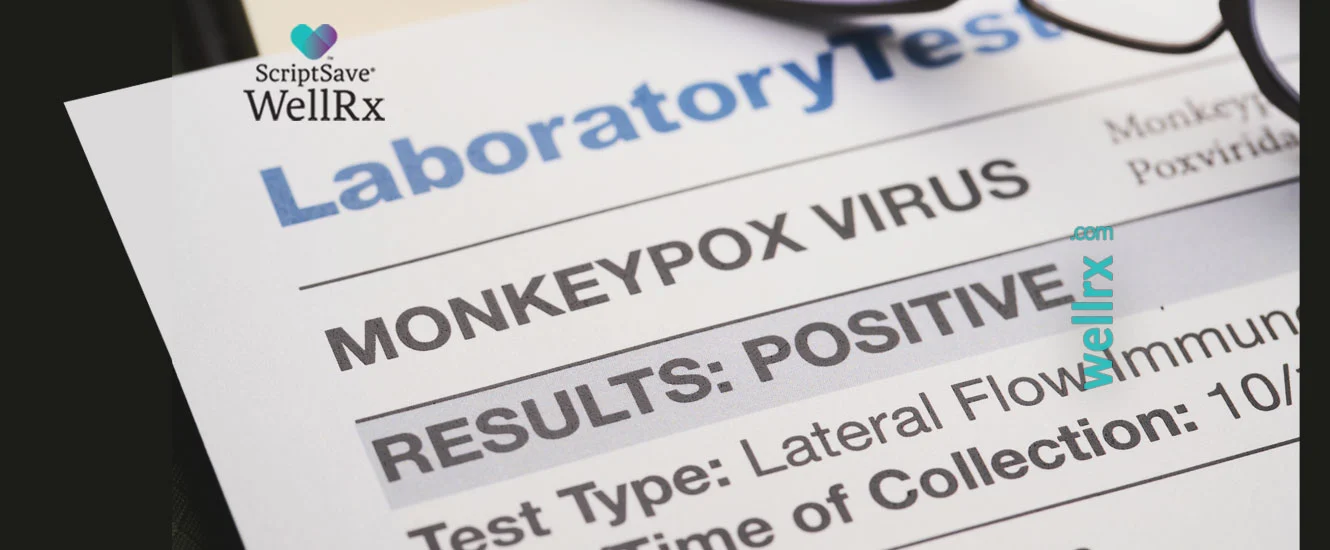As if we haven’t been pummeled enough with the COVID-19 pandemic, Mpox (previously named Monkeypox) appeared in 2022 and infected 29,000 Americans. While Mpox was originally found only in animals, the first human infection occurred in Africa in 1970.
Sporadic cases have popped up in Europe, Asia, and the United States since then. With this outbreak, human-to-human transmission has spread the virus to people worldwide.
Let’s look at Mpox risk factors, signs, symptoms, and treatments and review the antiviral medications at a pharmacy being used to treat Mpox.
Mpox Is Caused by a Virus Found in Rodents
Mpox is a zoonotic disease, meaning it comes from animals and spreads to people. But monkeys aren’t the cause. A virus carried by rodents is instead. The disease was formerly named Monkeypox because it was first discovered in monkeys.
Rodents in the West and Central African rainforest, such as tree squirrels and pouched rats, serve as the reservoir or hosts for the virus. Rodents do not exhibit signs of the disease, but non-human primates and people do.
Mpox is Related to Smallpox
The Mpox virus is related to the smallpox virus. Early human cases of Mpox in Africa occurred mostly in children and young adults who had not been vaccinated against smallpox. The smallpox vaccine offered some immunity against Mpox.
Smallpox vaccinations stopped in 1980 after smallpox was eradicated. Most of those who received the vaccine bear the telltale circular scar on their upper arms. With fewer people immune to smallpox and protected against Mpox, herd immunity waned. That’s to say, with fewer people in the group vaccinated, less protection against infection is offered to the entire group. As a result, Mpox spread more easily.
How You Get Mpox
Mpox spreads most easily through direct contact including:
- Touching the Mpox rash, sores, or scabs
- Sexual contact, including vaginal, anal, and oral sex
- Skin-to-skin contact, especially touching genitalia (most people in the current outbreak have genital sores)
- Contact with an infected person’s saliva through kissing
- Transfer of the virus from the mother to her unborn baby
Transmission during this outbreak has been atypical. In past outbreaks, exposure occurred during travel to Western and Central African countries where the virus is regularly found or endemic. It has also been associated with the exotic pet trade. An outbreak in the United States in 2003 stemmed from imported Gambian pouched rats.
With the current outbreak, exposure occurs predominantly through sexual contact. During this outbreak, 98% of those infected are men. And of these men, 96% identify as men who have sex with men or have multiple partners. Those who are immunocompromised (HIV, organ transplant recipients, etc.) have a greater risk of contracting Mpox.
The virus is less likely to spread by touching objects or surfaces contaminated with the Mpox virus. Only a small fraction of people have contracted Mpox through casual or household contact during this outbreak.
Scientists continue to research whether the virus is spread by someone who has no symptoms.
The Flu-Like Signs and Symptoms of Mpox
The time from exposure to signs and symptoms of the disease is typically from one to two weeks. After this incubation period, early signs of an Mpox infection may include any of the following:
- Fever and chills
- Headache
- Fatigue
- Swollen lymph nodes
- Muscle aches
- Cough, sore throat, and nasal congestion
Mpox Skin Lesions
A painful rash with anywhere from several to up to a hundred distinct lesions develops. The rash initially appears like pimples or blisters and can occur anywhere on the body, including the palms and soles of the feet. With this outbreak, skin lesions typically appear on the genitalia. Genital lesions are particularly painful and may require pain medications (see below).
The lesions contain the Mpox virus and touching them without gloves or forgetting to thoroughly wash your hands can lead not only to the spreading of lesions elsewhere on your body but also to the transmission of the disease to others.
Over several weeks, lesions take on the appearance of pus-filled sores and then cover with scabs. The lesions are infectious until the scabs fall off and new skin grows over the area.
Risk Factors for Severe Disease
An Mpox infection typically resolves within two to four weeks without any long-term effects. Most people don’t require hospitalization and can receive treatment at home.
Factors that increase your risk of severe disease include:
- Untreated HIV infection or AIDS
- Weakened immunity due to an organ transplant, steroid (prednisone) use, or cancer treatment
- Inflammatory skin conditions including psoriasis and eczema
- Pregnancy or breastfeeding
- Childhood
Fatal infections are rare, and when they do occur, they usually result from swelling and infection in the brain. If you are at risk for severe disease, early treatment with antiviral medication may reduce your chance of serious complications from Mpox.
Treatment for Mild to Moderate Cases of Mpox
Currently, no specific treatment for Mpox exists. Therapy for mild to moderate cases of Mpox is aimed at:
- Keeping sores clean and dry
- Managing your pain from the lesions
- Drinking plenty of fluids to prevent dehydration and to soothe your mouth sores
- Treating bacterial infections that develop around the lesions with antibiotics
- Treating any associated sexually transmitted infections
- Testing for HIV/AIDS and beginning antiretroviral therapy (HIV medicines) if the test is positive
Treating the Pain and Itching from Mpox Lesions
Mpox lesions can be extremely painful and itchy, particularly in the genital area and mouth. For mild to moderate pain, over-the-counter medications and remedies may be enough:
- Acetaminophen (Tylenol)
- Ibuprofen (Advil, Motrin)
- Topical pain relievers, such as lidocaine patches (Salonpas) to use only on areas without open sores or skin breakdown
- Warm sitz baths for genital and anal lesions
- Gargling with alcohol-free mouthwash
For more severe pain, your healthcare provider may prescribe stronger pain medications, including gabapentin (Neurontin) or opioids. You and your healthcare provider must weigh the risks and benefits of opioid use.
It’s important to treat the itchiness that comes as the Mpox lesions begin to heal. With less scratching, the likelihood of secondary infection and scarring is reduced. Dermatologists recommend you trim your fingernails to minimize damage from scratching the lesions. You may also benefit from anti-itch treatments:
Antiviral Medications for Severe Mpox
No antiviral medications are currently approved for Mpox, but clinical trials of tecovirimat (TPOXX) are ongoing. Tecovirimat is approved for the treatment of smallpox and recommended for the treatment of Mpox if:
- You have a severe case of Mpox
- You are at risk for developing severe disease
- You are HIV positive, have AIDS, or have a weakened immune system due to cancer treatment or organ transplant, for example
- You have extremely painful Mpox lesions, particularly in your mouth, throat, anus, or genital area
- Your eyes are affected by the disease
Tecovirimat is the first-line therapy and is available through participation in a clinical trial. Alternatively, your healthcare provider may get authorization from your public health department to treat you with this medication.
Another antiviral medication approved for smallpox, Brincidofovir, may be used if you fail to improve with tecovirimat, especially if you are HIV positive.
Mpox and Eye Infections
Mpox may cause eye infections, including:
- Conjunctivitis
- Inflammation of the cornea (the outer surface of your eye)
- Corneal ulcers
- Eyelid infections
If you have any signs of eye involvement, your healthcare provider will begin treatment with tecovirimat and trifluridine (antiviral eye drops).
Mpox Vaccines
If you’ve been exposed to open Mpox sores or scabs, respiratory droplets, or other body fluids from an infected person, you should receive JYNNEOS, a smallpox and Mpox vaccine.
The JYNNEOS vaccine works even after you’ve been exposed to the virus. Since the time from exposure to Mpox to getting the disease is one to two weeks, you can get the vaccine during the virus’ incubation period to lessen the disease’s severity or prevent it altogether.
According to the Centers for Disease Control and Prevention, how soon you get the vaccine after exposure makes a difference:
- Within four days of exposure, the vaccine may prevent the disease
- From five days to two weeks after exposure, the vaccine may reduce the severity of Mpox
Ways to Save on Over-the-Counter and Prescription Medications
A case of Mpox may have you out of work for a month. Finding the lowest prescription prices becomes more important than ever. You can easily compare over-the-counter and prescription medication prices at a pharmacy near you by entering the drug name and your zip code on ScriptSave WellRx.
In addition to saving money in the comfort of your own home, you can learn how prescription discount cards work, receive coupons for medications, and sign up for your free Rx savings card on WellRx.
Take a look at WellRx’s 30-second video for more information.
Reducing the Spread of Mpox
If you’ve been exposed to Mpox, check your temperature and monitor yourself for flu-like symptoms and rashes for 21 days. If you have no fever and are asymptomatic, you do not need to quarantine. If you develop symptoms of Mpox, isolate yourself and contact your healthcare provider or public health department immediately.
If you have active disease with open Mpox sores or scabs, you are contagious until all the scabs have fallen off and new skin covers the sores. This may take four weeks to occur. In the interim, you can minimize the spread of Mpox by:
- Keeping your sores covered as much as possible with clean clothing or bandages
- Avoiding intimate contact until your sores are completely healed and covered with new skin
- Not allowing others to have contact with your bed linens or dirty clothing
- Maintaining social distancing
- Wearing a mask
- Washing your hands with soap and water or using hand sanitizer
- Avoiding contact with your pets
Additionally, the World Health Organization recommends condom use during any sexual activity for 12 weeks after your skin lesions have healed (scabs off and new skin completely covering the former lesions).
Long-Term Complications from Mpox
Early reports from this outbreak of Mpox indicated a complete recovery was likely to happen for most people. Notable exceptions include:
- Vision loss due to corneal scars
- Narrowing of the anus, vagina, or urethra (the tube that empties urine from the bladder) due to scarring from Mpox lesions
But those recovering from Mpox voice concerns over chronic pain, lasting visible scars from their lesions, and the stigma associated with the disease. You can read more about their long-term sequelae here.
Teresa Otto, MD, is a freelance medical writer on a mission to inform readers about the positive impact of good nutrition and a healthy lifestyle. She is a retired anesthesiologist who practiced in Billings, Montana, for most of her career. She graduated from the University of Washington School of Medicine in Seattle and did her anesthesia residency and fellowship at New York University and Columbia-Presbyterian in New York.
Resources:
- https://www.nejm.org/doi/full/10.1056/NEJMra2208860
- https://apic.org/monthly_alerts/herd-immunity/
- https://www.cdc.gov/poxvirus/monkeypox/if-sick/transmission.html
- https://www.ncbi.nlm.nih.gov/books/NBK574519/
- https://jamanetwork.com/journals/jamaneurology/fullarticle/2796513
- https://www.cdc.gov/poxvirus/monkeypox/clinicians/clinical-recognition.html#:~:text=Key%20Characteristics%20for%20Identifying%20Monkeypox&text=Lesions%20are%20firm%20or%20rubbery,areas%20or%20in%20the%20mouth.
- https://hivinfo.nih.gov/understanding-hiv/fact-sheets/fda-approved-hiv-medicines
- https://assets.ctfassets.net/1ny4yoiyrqia/205qKUkE21zKDDSL3KBDq/46124bcc4bf0c0fabbe7a84a490efe73/AAD-Monkeypox-Caring-for-Skin.pdf
- https://www.niaid.nih.gov/diseases-conditions/monkeypox-treatment
- https://publichealth.jhu.edu/2022/what-you-need-to-know-about-monkeypox
- https://www.cdc.gov/poxvirus/monkeypox/clinicians/treatment.html#:~:text=The%20medical%20countermeasures%20currently%20available,Cidofovir%20is%20also%20available%20commercially.
- https://www1.nyc.gov/assets/doh/downloads/pdf/monkeypox/what-to-do-when-sick.pdf
- https://www.nbcnews.com/nbc-out/out-health-and-wellness/life-monkeypox-men-describe-uncertain-road-recovery-rcna49195













 Store & manage your medication list
Store & manage your medication list Medication pricing updates
Medication pricing updates Pill & refill reminders
Pill & refill reminders Medication journal & mood log
Medication journal & mood log